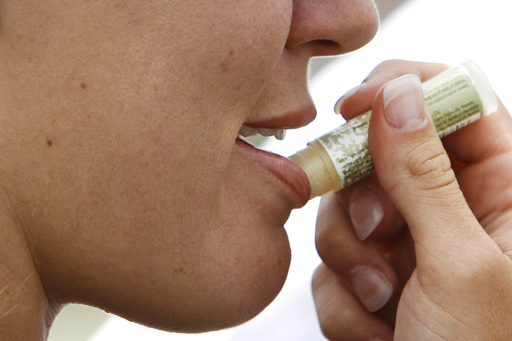NEW YORK — A tube of lip balm might seem like an ideal solution for dry, chapped lips.
However, questions arise over whether these over-the-counter remedies actually alleviate flaking or potentially exacerbate the issue.
Although dry lips can affect individuals throughout the year, they tend to be more prevalent during the colder months.
The combination of frigid outdoor air and low humidity levels inside can rob lips of their moisture.
According to dermatologist Dr. Jenna Lester from UCSF Health, lip balm can effectively help trap moisture within the lips.
“That acts as a protective barrier against external elements,” such as biting winds, she explained.
Do lip balms really work?
For many individuals, lip balms serve as a beneficial ally against chapped lips.
Yet, some may find that they are sensitive to the fragrances, flavors, and preservatives often present in popular lip care products.
Instead of providing relief, these might cause additional irritation upon application.
“Those individuals will often lament, ‘I tried these products hoping for improvement, but it just got worse,’” noted Dr. Caroline Mann, a dermatologist at Washington University School of Medicine in St. Louis.
It’s helpful to be aware of particular ingredients that could trigger a reaction, including flavoring agents and lanolin, a waxy compound derived from sheep, which is common in many moisturizers.
Allergic responses can also stem from preservatives like formaldehyde and the sunscreen agent oxybenzone.
Dr. Mann pointed out that these reactions originate from our immune system and can occur unexpectedly, manifesting after varying usage and potentially lasting for months.
For those with sensitive lips, it is generally advisable to opt for a fragrance-free, petroleum-based balm, commonly labeled as petrolatum, dermatologists suggest.
Soothing chapped lips can also be achieved through alternative methods aside from lip balm.
Utilizing a scarf to cover your lips when outdoors or employing a humidifier indoors can help counteract dry air.
Adequate hydration is essential, so maintaining good water intake is also recommended.
One habit to avoid is licking your lips.
Although this might seem to provide temporary relief, saliva evaporates swiftly and takes moisture away along with it, leading to even drier lips.
If you find that reducing lip balm use still leaves your lips irritated, consulting a dermatologist for further advice could be beneficial.
“By following these suggestions, you can make it through the winter with soft and healthy lips,” Mann concluded.


